Australia/Israel Review
50 years of history with the AIR
Dec 18, 2024 | AIJAC staff
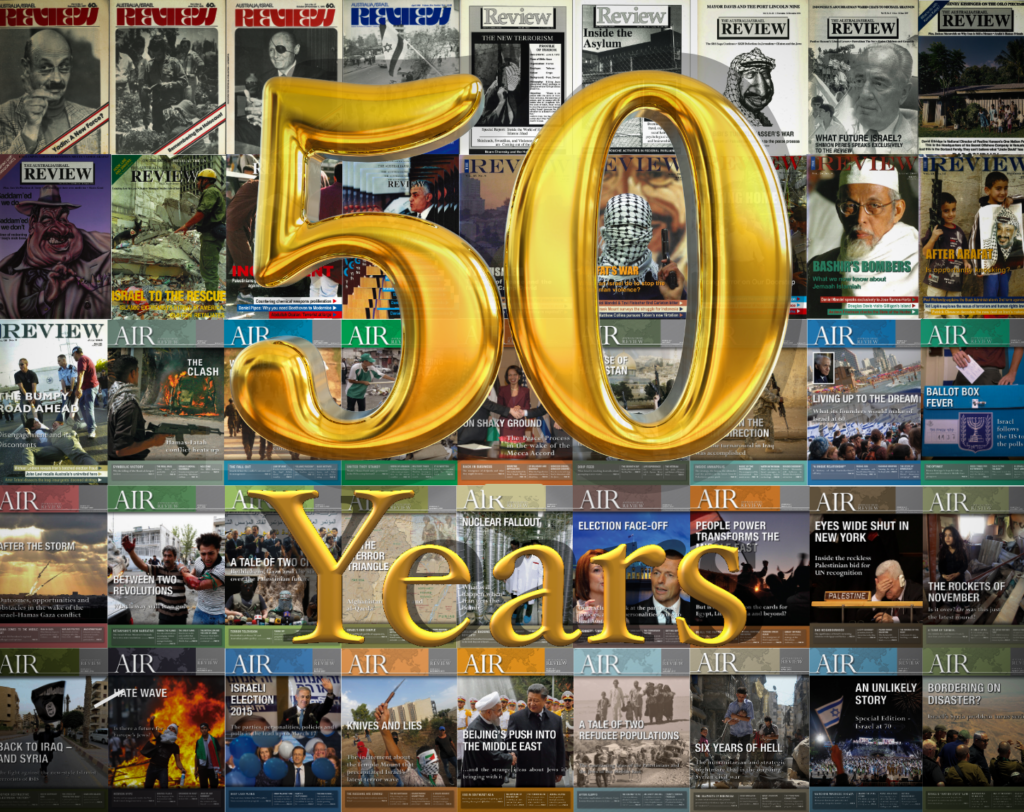
Over the past 50 years, the Australia/Israel Review has covered, in its own unique way, numerous dramatic and world-changing events in Australia, Israel and around the world – and broken some major stories with significant effects on Australian political life. Below, we ask you to walk with us through a few of those events and stories through the medium of some of our favourite past editions – out of the nearly 1,000 published over the last half-century.
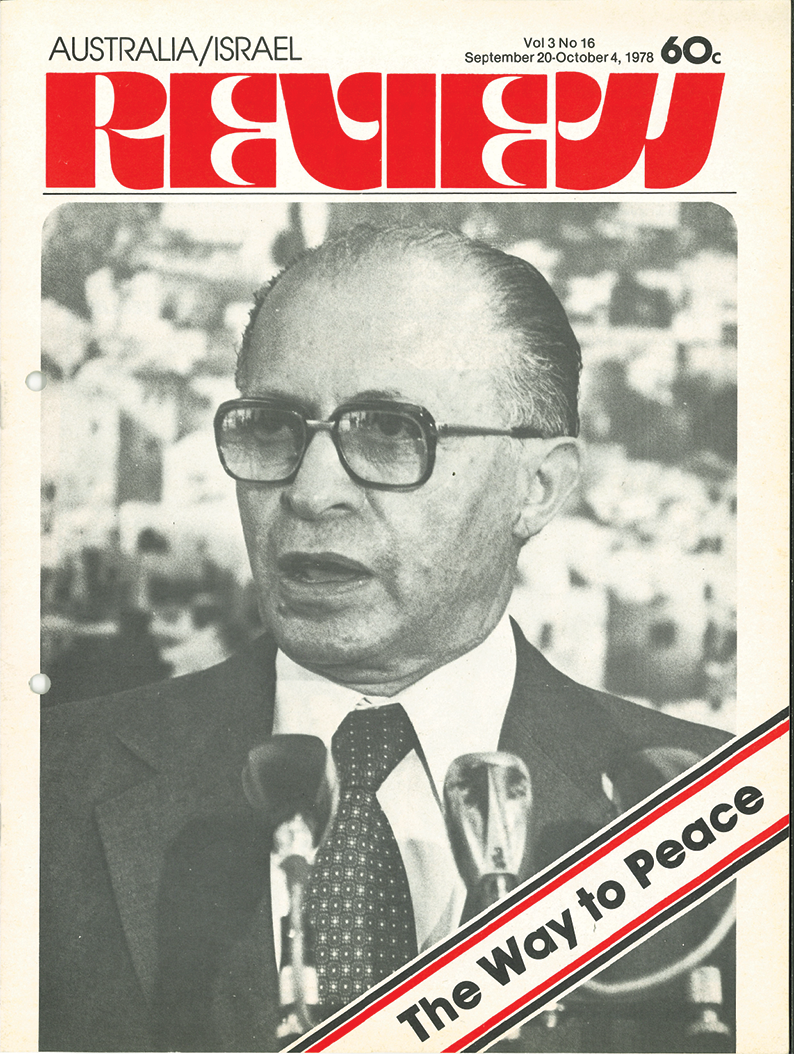 Vol. 3, No. 16 – September 20-October 4, 1978
Vol. 3, No. 16 – September 20-October 4, 1978
First Camp David Summit between Israel and Egypt
Sam Lipski, Editorial:
“As we prepare to welcome the Jewish New Year, 5739, it is tempting to introduce a new method of historical dating: BCD Before Camp David and ACD – After Camp David.”
Vol. 4, No. 1 – February 14-28, 1979
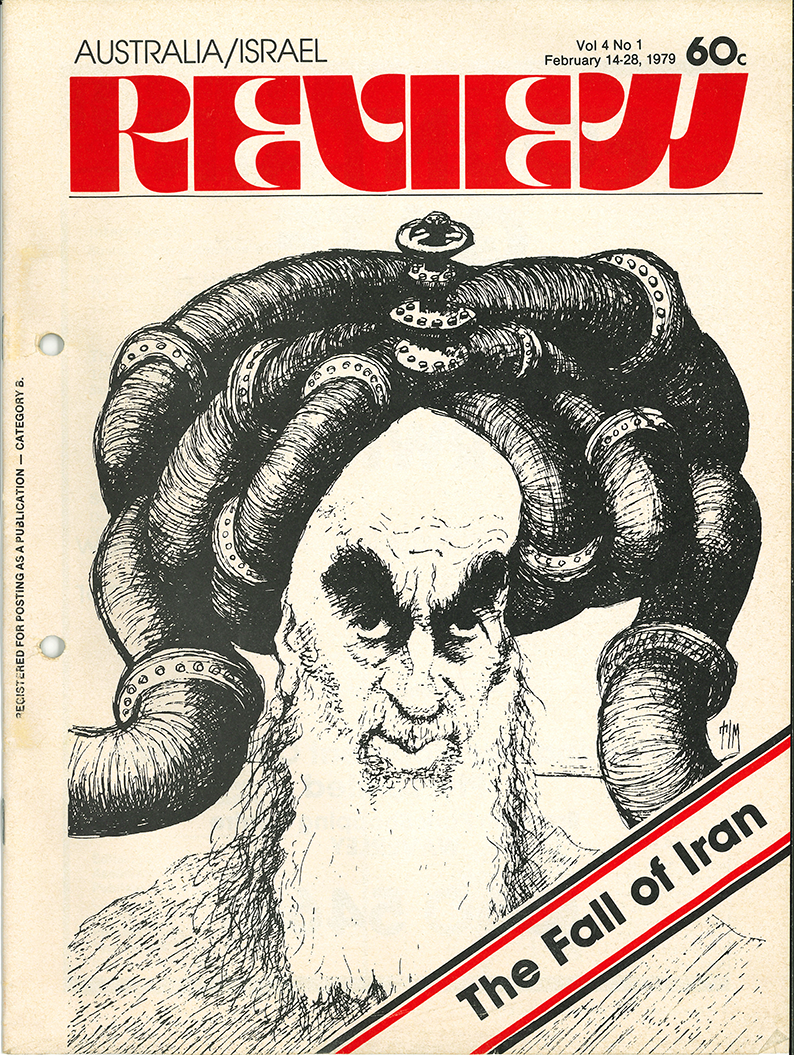 Islamic revolution in Iran overthrows the Shah
Islamic revolution in Iran overthrows the Shah
Chaim Herzog, “Iran and Islam”:
“The main hinge of Western defence was until now Iran, but it no longer occupies that position. For the defence to be realistic, it must be based on political stability, otherwise it has no meaning whatsoever. Political stability and military ability are concentrated today in only one country in the Middle East, namely, Israel. Any new defence scheme of things must establish itself on the firm base provided by Israel.”
Vol. 11, No. 19 – October 21-November 3, 1986
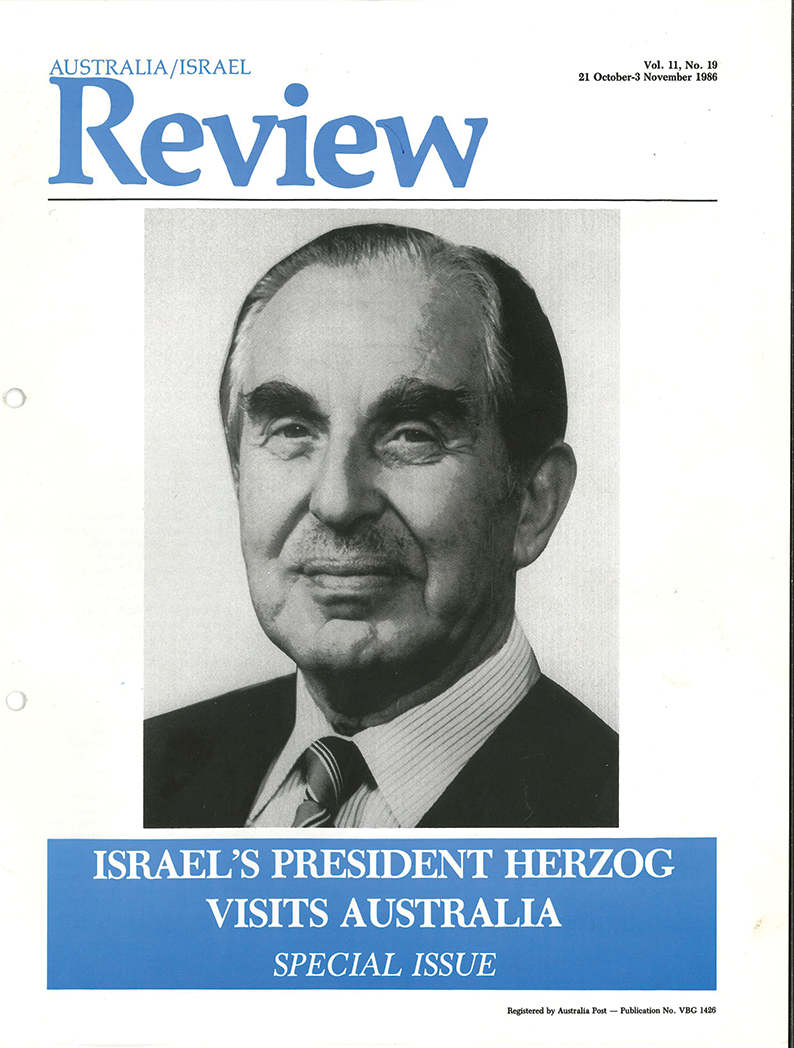 Chaim Herzog becomes first Israeli President to visit Australia
Chaim Herzog becomes first Israeli President to visit Australia
Isador Magid and Robert Zablud, co-chairmen of AIR, Comment:
“The official State Visit to Australia by Israel’s 6th President Chaim Herzog (November 4-10) is symbolic of the excellent relationships between our two countries. This affinity is based on their common values: parliamentary institutions, the rule of law, freedom of the press and association, and respect for the dignity of the individual.
“Ever since the positive UN role played by Australia in Israel’s creation, successive Australian governments have consistently supported Israel’s quest for security and a just, negotiated peace with its neighbours…”
Vol. 13, No. 6 – April 15-May 8, 1988
Israel’s 40th Anniversary… and Australia’s 200th
Rabbi John S. Levi, AIR editorial board member, “Israel at 40 – Australia at 200”:
“Australia became a nation in 1901. It fought its wars on battlefields and jungles far from its cities and shores. The safest street and field in Israel is only 30 kilometres from a hostile border. What country, other than Israel, could survive the danger, the abuse and the hatred of the past 40 years and still flourish?
“Australia has the courage to be one of the two or three countries in the United Nations to stand apart from the unremitting Arab and Soviet-inspired attacks upon Israel’s legitimacy and statehood, and to vote against them. Australia took a crucial role in the debate to partition Palestine and establish a Jewish State just over forty years ago. Ever since then the fate of these two disparate countries has been linked by that most mysterious bond – a sense of friendship.”
Vol. 16, No. 20 – November 6-19, 1991
Madrid Peace Conference – first multilateral Arab-Israel face-to-face Summit
Jeremy Jones, Comment:
“In the aftermath of the Madrid meeting the role of America must be to try to maintain the dynamic for peace while resisting the temptation to impose a solution which would increase rather than lessen the bitterness.”
Vol. 18, No. 16 – September 7-20, 1993
Yitzhak Rabin and Yasser Arafat kick off the Oslo peace process with a signing ceremony on the White House lawn
Colin Rubenstein, Editorial:
“Without ignoring the real risks, we can only welcome the historic Israeli/Palestinian agreement as potentially representing a turning point on the road to genuine peace between Israel and her neighbours… One can only hope that the prediction of Israel’s opposition Likud leader Benjamin Netanyahu who, fearing an unrepentant PLO state, warned the deal ‘is a guarantee of increased tension, future terrorism, and ultimately, war’ is not fulfilled.”
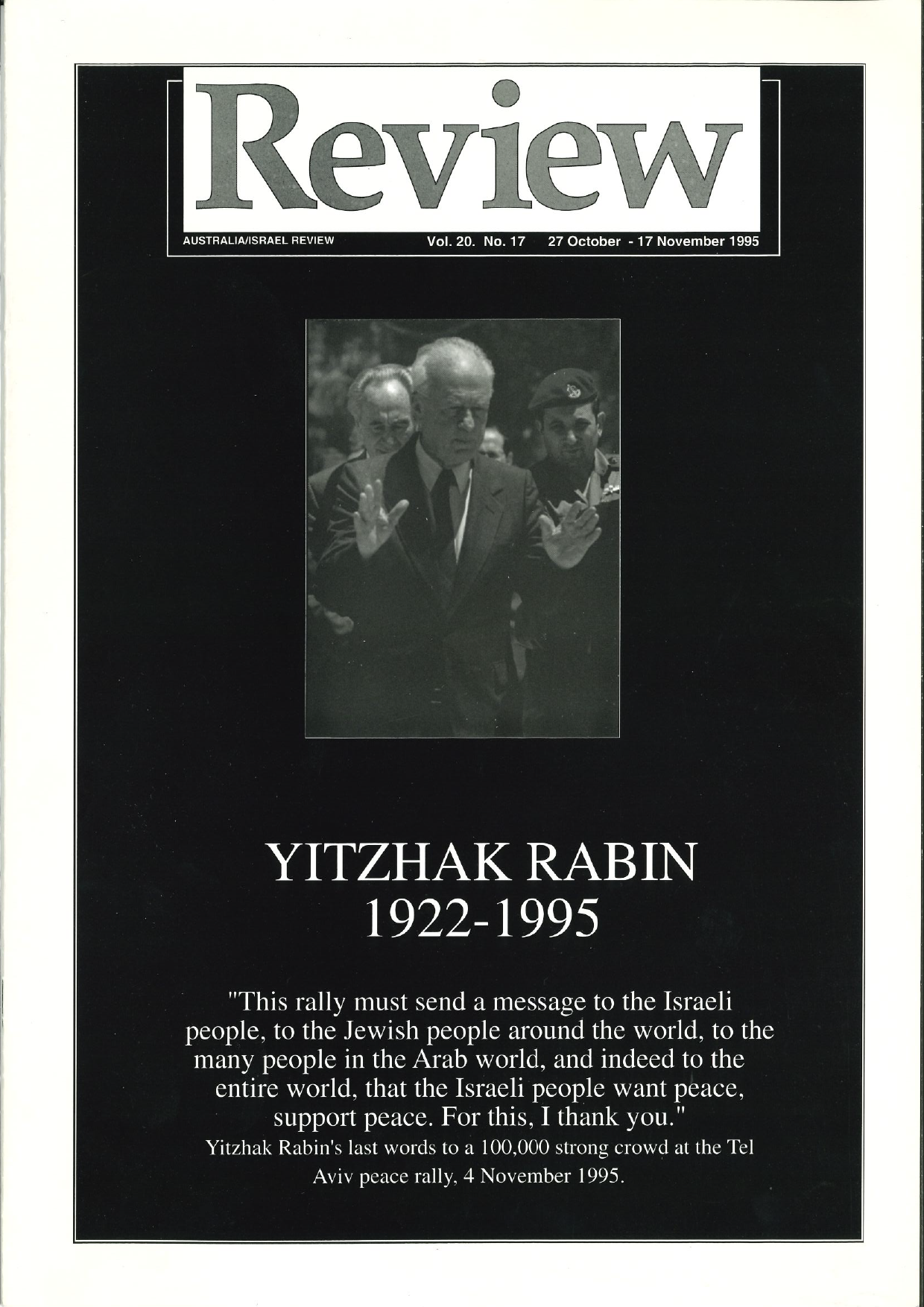 Vol. 20, No. 17 – October 17-November 20, 1995
Vol. 20, No. 17 – October 17-November 20, 1995
Rabin is assassinated by a Jewish extremist
Colin Rubenstein, Editorial:
“In that one fatal moment, Israel lost a unique and towering leader, one of extraordinary courage, commitment and vision. His like may not come again… it becomes the responsibility of all of us, Israelis, Australians, people of goodwill around the world, to see that this great Israeli statesman leaves behind a lasting legacy, a legacy of peace.”
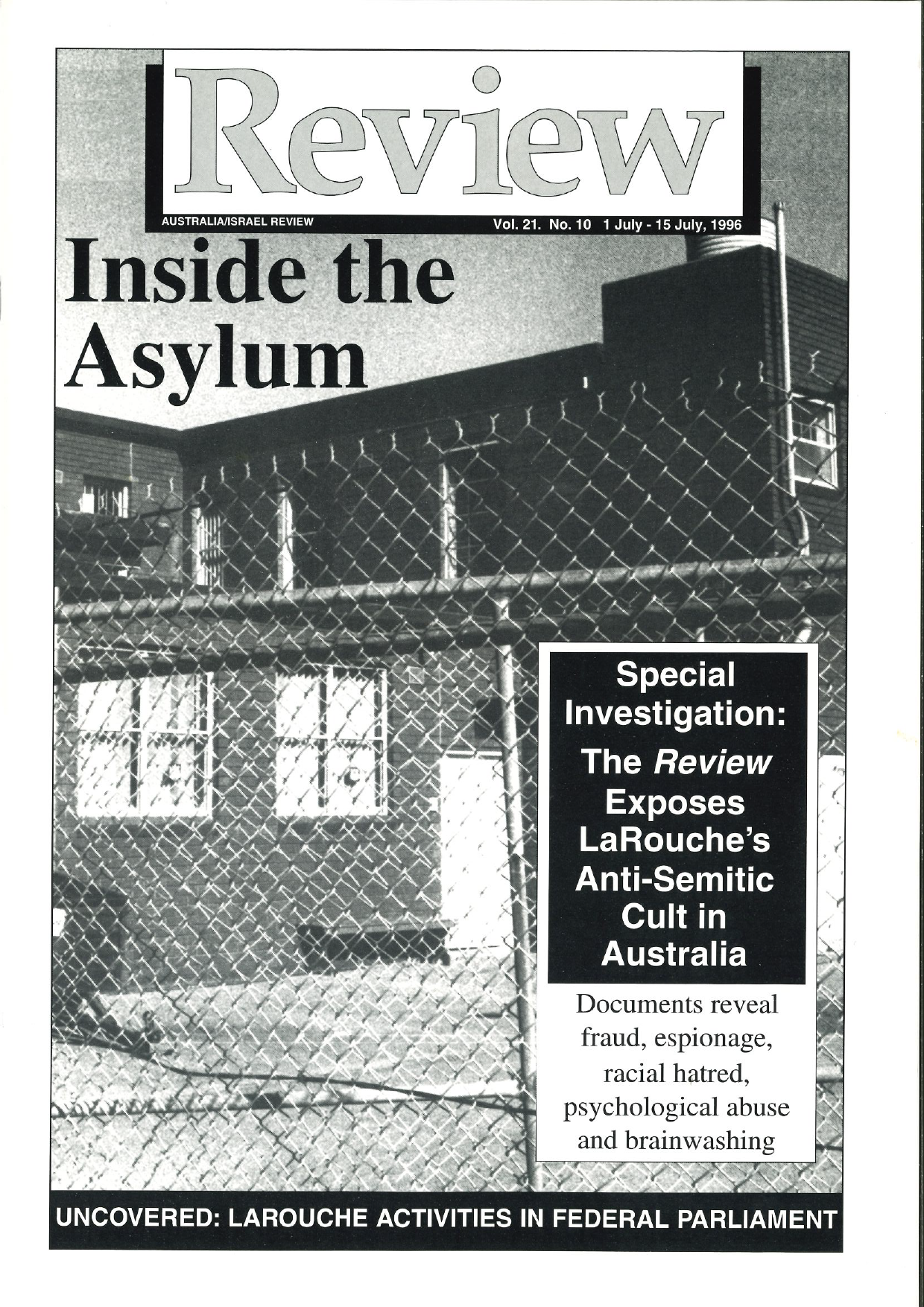 Vol. 21, No. 10 – July 1-15, 1996
Vol. 21, No. 10 – July 1-15, 1996
An AIR investigation exposes the devious and underhanded tactics of the Citizens Electoral Council (CEC), the Australian followers of American fraudster and conspiracy theorist Lyndon LaRouche
Colin Rubenstein, Editorial:
“The activities of the CEC have continued unchecked for more than five years. They have grown from strength to strength. All Australians have the right to live free of harassment with their basic privacy and personal security ensured. It is a right which every Australian Government undertakes to protect.”
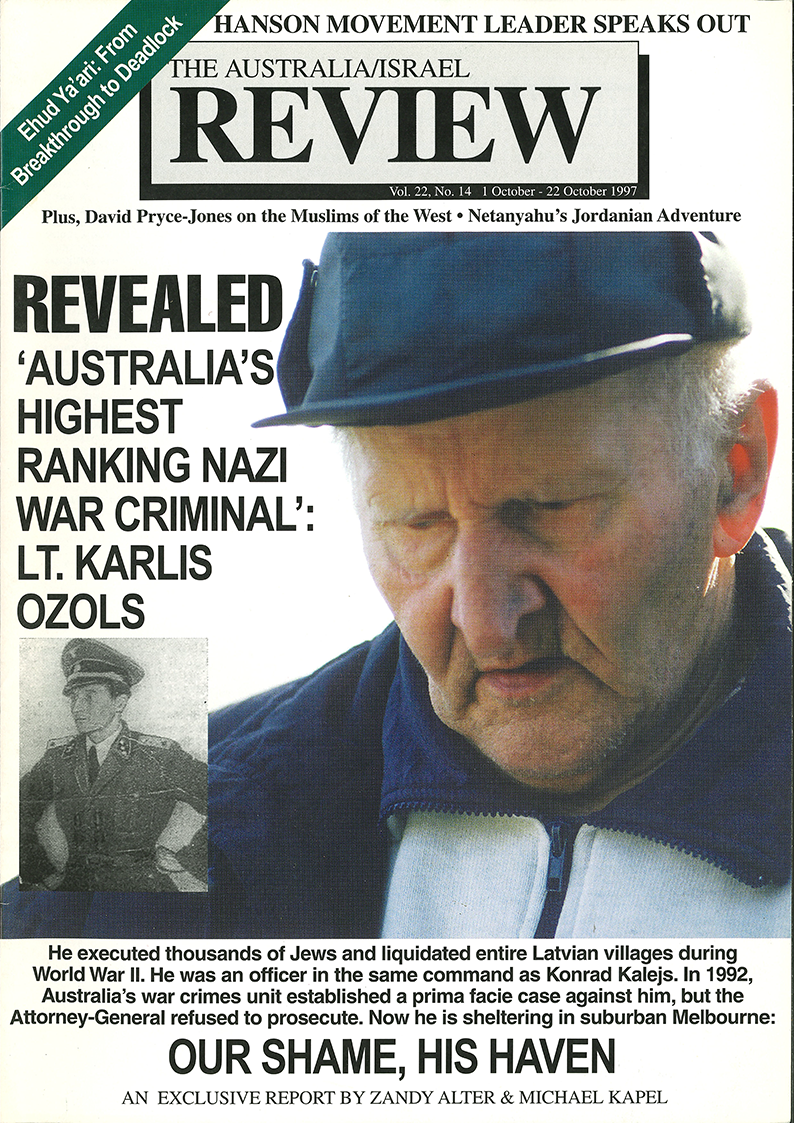 Vol. 22, No. 14 – October 1-22, 1997
Vol. 22, No. 14 – October 1-22, 1997
An AIR investigation tracks down Australia’s most senior living alleged Nazi war criminal, Karlis Ozols
Zandy Alter and Michael Kapel, Cover story:
“Karlis Ozols refused to talk to the Review this week when he was contacted for a response. However, his wife claimed that all the wartime killings that had taken place in Latvia had been conducted by Jews. She also told the Review that she has evidence that ‘Jews who worked for the KGB are responsible’ for the claims against her husband. Mrs Ozols said that the stories about her husband ‘are wrong’ and that they have no further comment. When asked whether her husband had been the subject of investigations by the SIU [Ed. Special Investigations Unit], she said it was ‘none of your business.’”
 Vol. 25, No. 8 – August 2000
Vol. 25, No. 8 – August 2000
Ehud Barak and Yasser Arafat, hosted by US President Bill Clinton, discuss peace at Camp David
Daniel Mandel, Cover story:
“The Israelis imagined the hostilities giving way to negotiated outcomes. The Palestinians treated hostilities as placed in abeyance pending the satisfaction of their terms. To this end, Israelis have talked up and Palestinians talked down peace. Arafat has done nothing to moderate Palestinian hopes or demands, or to ready his people for concessions.”
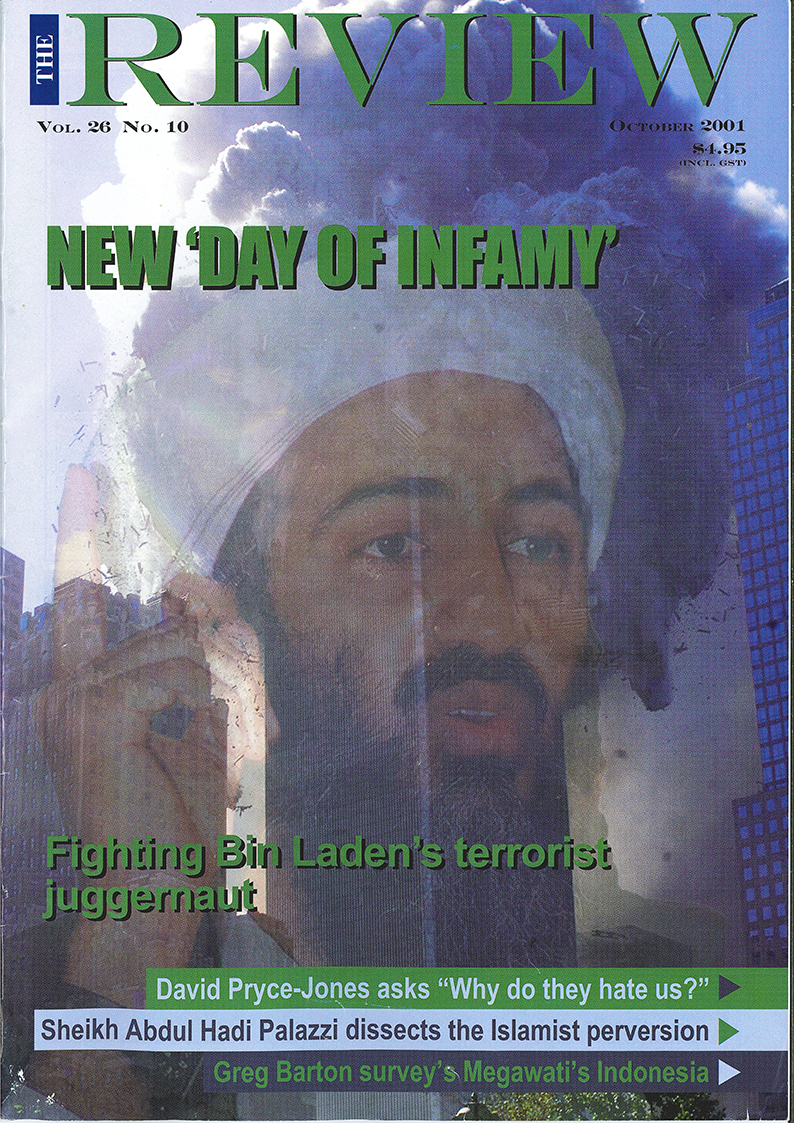 Vol. 26, No. 10 – October 2001
Vol. 26, No. 10 – October 2001
The September 11 terror attacks in the US
Colin Rubenstein, Editorial:
“The US, Australia, and our allies will now wrestle with a global terrorist problem which is slippery, elusive, and not amenable to simple solutions, and in which serious moral questions will doubtless need to be debated. But there should be no doubt, the carefree complacency of the democracies a mere two weeks ago is a thing of the past.”
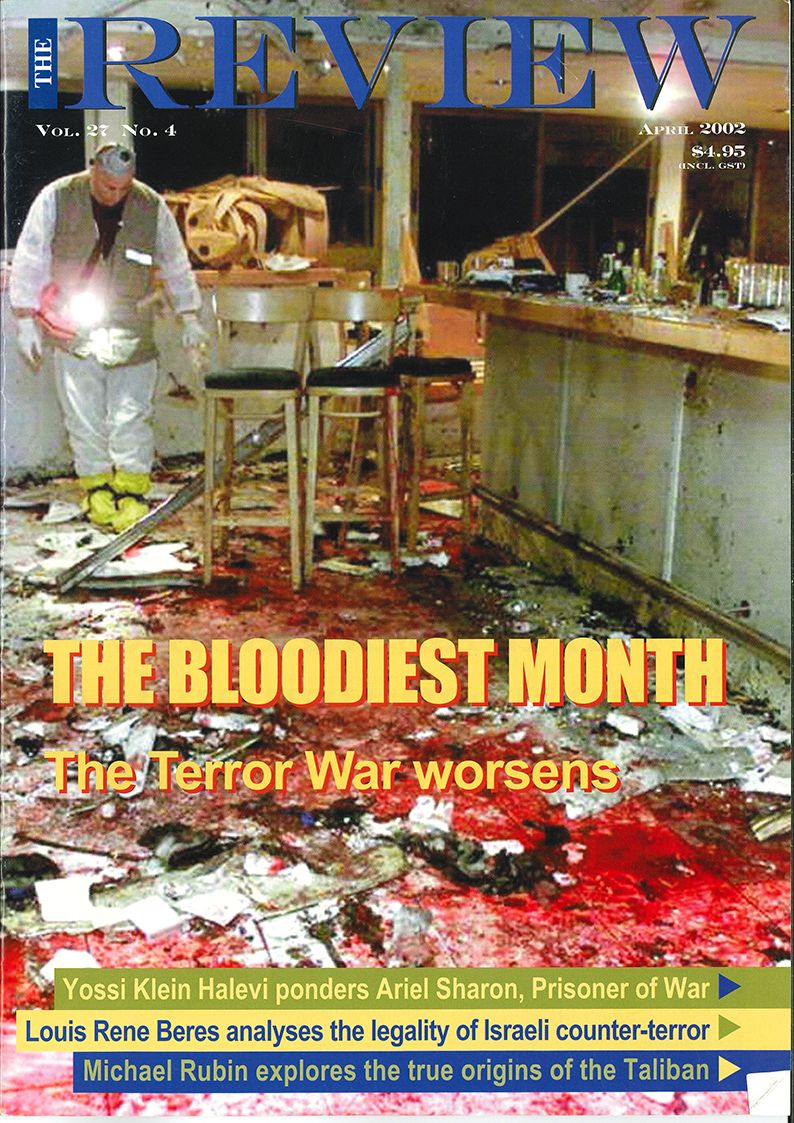 Vol. 27, No. 4 – April 2002
Vol. 27, No. 4 – April 2002
The terrorist violence of the Second Intifada reaches a bloody crescendo in Israel
Colin Rubenstein, Editorial, “The Bloodiest Month”:
“Many often assume that the current situation is a ‘cycle of violence’. The conventional wisdom has it something like this: Palestinians are angry at being ‘occupied’ and ‘humiliated’ by Israel. In their despair, they make terrorist attacks on Israel. This leads to both Israeli reprisals, which makes Palestinians more angry and more likely to carry out terrorist attacks, and Israeli insecurity… If only Israel could be made to see the situation of the Palestinians, or forced to do the right thing by the Americans, then, by a combination of restraint in response to Palestinian attacks and generosity in empowering Palestinians and ending their occupation, the causes of the violence will be removed and all Israel’s legitimate security needs will be met.
“Actually, this is a fundamental misunderstanding of the situation. The solution is correct – two states for two peoples – but the means of getting there is hopelessly naïve.”
 Vol. 30, No. 12 – December 2005
Vol. 30, No. 12 – December 2005
Israel unilaterally disengages from Gaza
Colin Rubenstein, Editorial:
“[Israeli Prime Minister Ariel] Sharon’s bold and costly move to disengage from Gaza unilaterally is clearly creating new opportunities for positive change… The Palestinians now urgently need to follow suit and marginalise their extremists if the cause of real peace is to be advanced.”
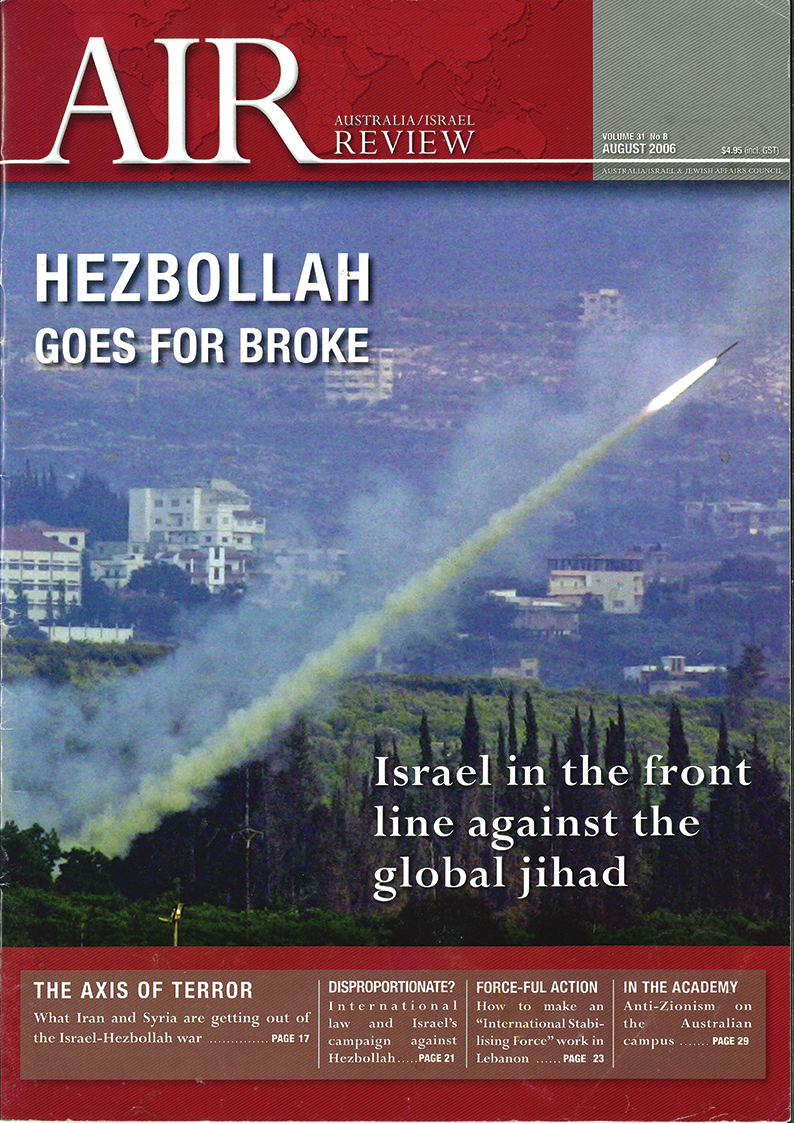 Vol. 31, No. 8 – August 2006
Vol. 31, No. 8 – August 2006
The 2006 Israel-Hezbollah war
Colin Rubenstein, Editorial:
“Israel has once again been dragged into a war it did not want and did not start… The obvious resolution of the problem is for Lebanon to regain control over its own foreign policy and all its territory, and thus obviate any need for Israel to respond militarily to Hezbollah attacks… Hezbollah must be significantly weakened, so that it has no ability to seriously interfere with the extension of Lebanese sovereignty.”
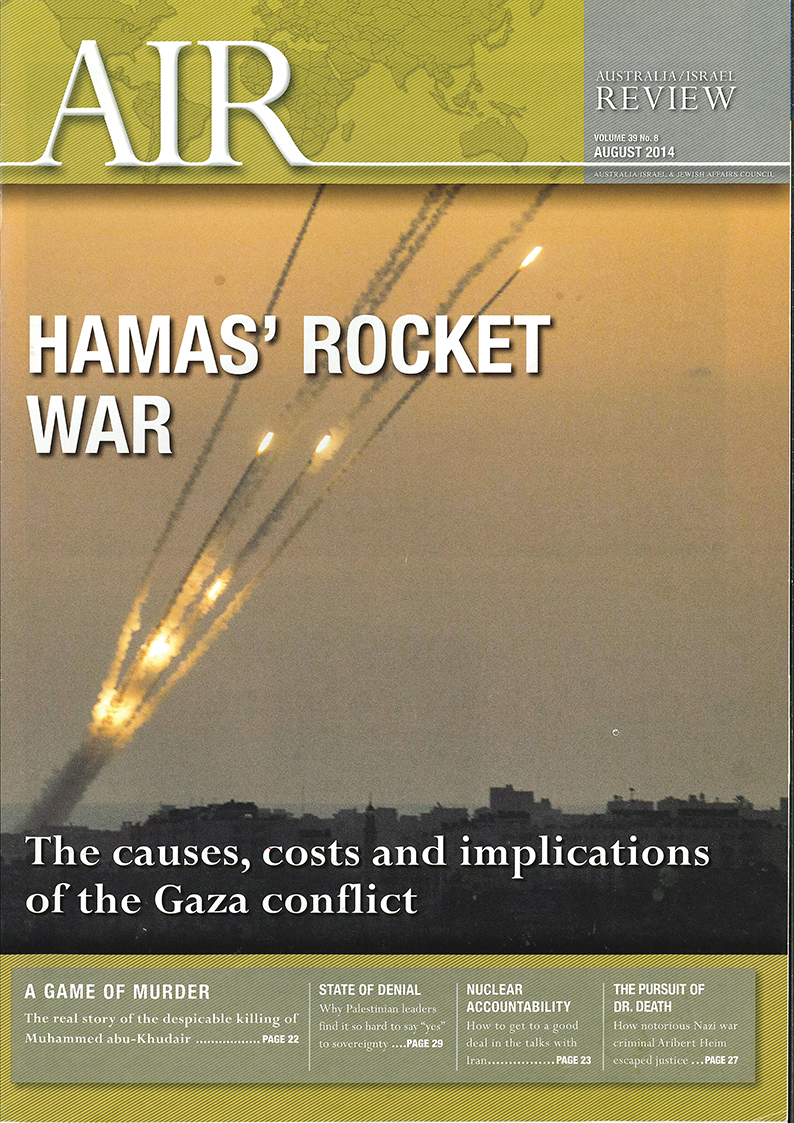 Vol. 39, No. 8 – August 2014
Vol. 39, No. 8 – August 2014
The 2014 Hamas-Israel war, one of four major wars Hamas provoked with Israel between 2008 and 2023
Colin Rubenstein, Editorial:
“Most responsible players in international diplomacy understand that handing Hamas… a victory would be suicidal for Israel. And not for Israel alone. Other extremist groups will be watching the Hamas example. Imagine if the principle is established that any response to a terror group firing rockets or launching terror from civilian areas is illegitimate because of the inevitable civilian casualties, and the only recourse the targeted party effectively has is to grant the terror group’s demands.”
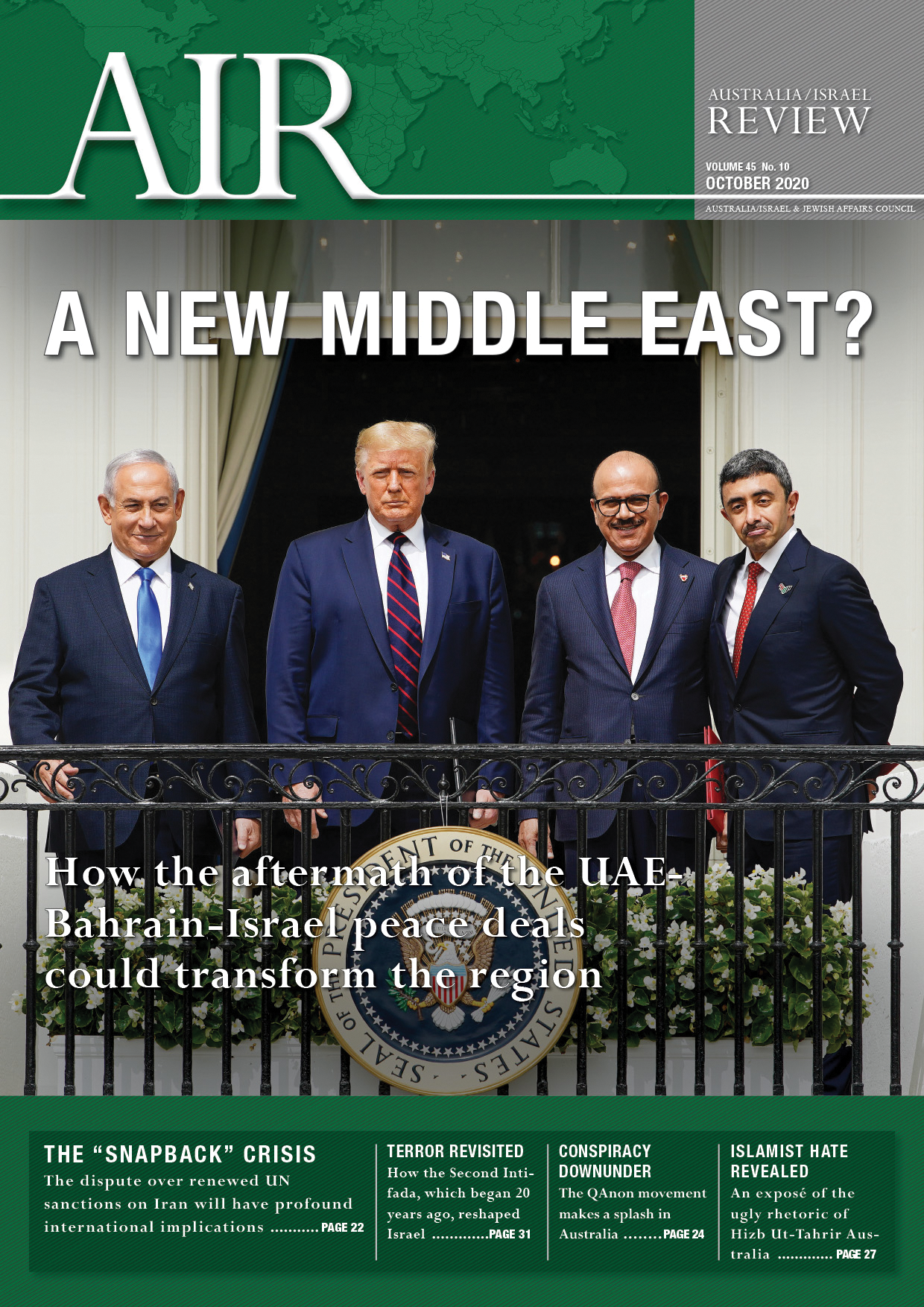 Vol. 45, No. 10 – October 2020
Vol. 45, No. 10 – October 2020
The Abraham Accords are signed, normalising relations between Israel and the UAE and Bahrain, later joined by Morocco
Colin Rubenstein, Editorial:
“Perhaps counterintuitively, [the Abraham Accords] have the potential to bring the Palestinians back to the negotiating table, as they remind their leaders that the world waits for no one. Palestinian leaders have the agency to take the brave steps necessary to negotiate an end to the conflict, and the establishment of a Palestinian state existing alongside Israel in peace and prosperity.”
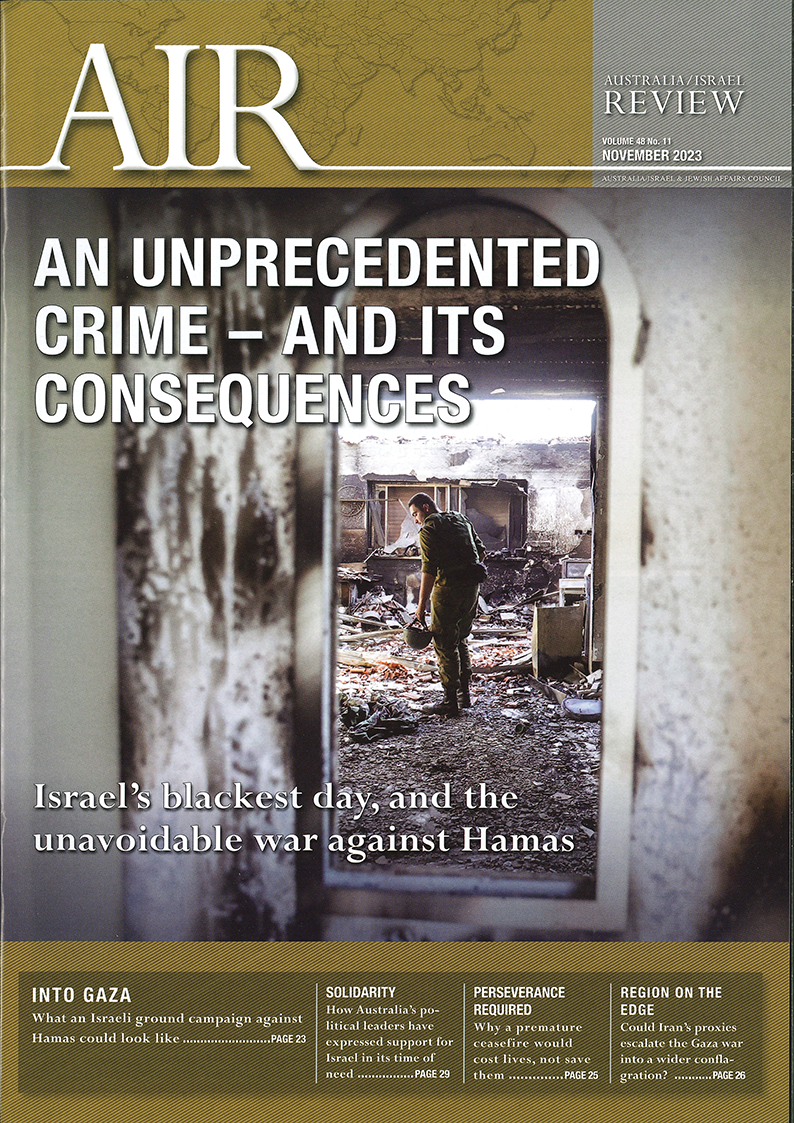 Vol. 48, No. 11 – November 2023
Vol. 48, No. 11 – November 2023
Hamas’ October 7 mass terror attack on Israel, leaving almost 1,200 people dead, and 250 taken hostage
Colin Rubenstein, Editorial:
“It is a very dark time – but the only hope to advance to a better one is for the rule of Gaza by bloodthirsty, Iranian-supported Hamas terrorists to be dismantled. Australia’s long-standing bipartisan goal of helping achieve a two-state Israeli-Palestinian peace is simply inconceivable without this being achieved. We hope that Australia’s political leaders will keep this in mind.”
Tags: AIJAC, Australia, Israel, Middle East






